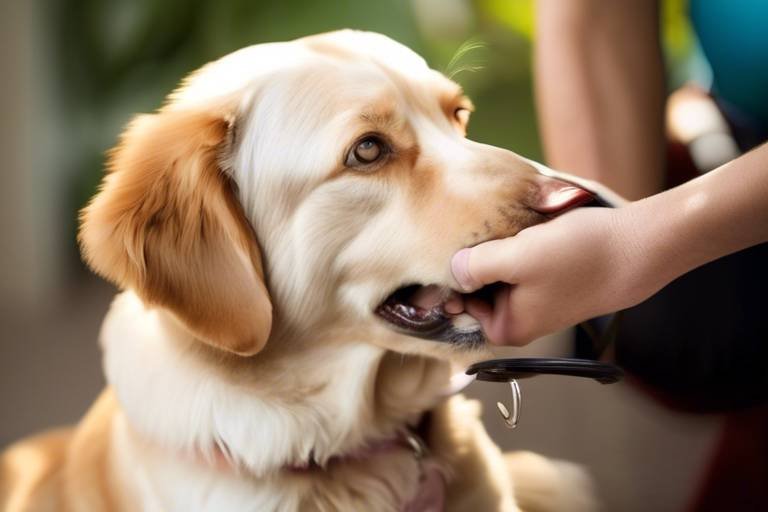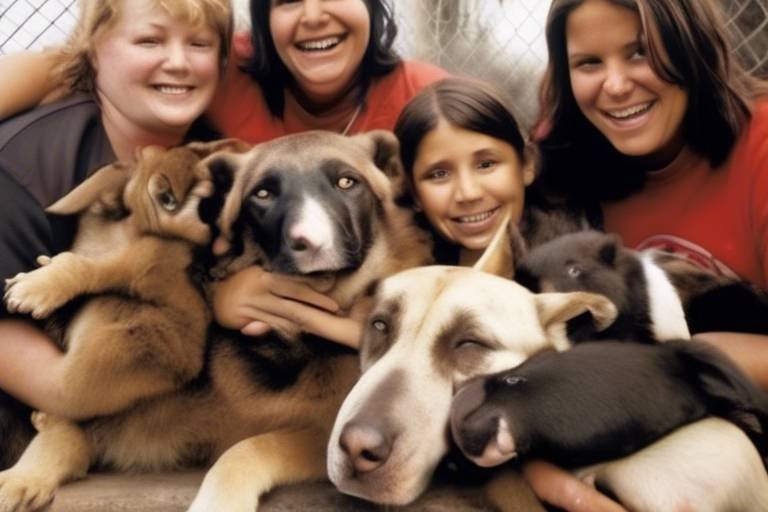The Power of Adoption - Changing Lives One Pet at a Time
Adoption is more than just a word; it's a transformative journey that changes lives—both for the pets who find their forever homes and for the people who welcome them in. Imagine walking into a shelter, where countless furry faces look up at you with hope, longing for a second chance. Each of these animals has a unique story, filled with past struggles, and yet, they all share a common dream: to belong. By choosing to adopt, you’re not just giving a pet a home; you’re opening your heart to a companion who will bring joy, laughter, and unconditional love into your life.
The impact of pet adoption extends far beyond the individual act. It ripples through communities, sparking a movement of compassion and responsibility. When you adopt, you're not just saving one life; you're inspiring others to do the same. This simple act can lead to a significant reduction in the number of homeless animals, helping to create a world where every pet has a loving family. Think about it: each adoption is a victory against neglect and abandonment, a testament to the power of love and commitment. It’s a reminder that we can all make a difference, one paw at a time.
Moreover, the benefits of pet adoption are profound and multifaceted. It’s not just about providing shelter animals with a roof over their heads; it’s about forging deep connections that enhance our lives. Pets have an uncanny ability to boost our mood, encourage us to be active, and even help us cope with life's challenges. By adopting a pet, you’re not just changing their life; you’re enriching your own. So, why not take that leap of faith? Embrace the joy of pet ownership and discover the incredible bond that can form when you give a homeless animal a chance at a new life.
In summary, the power of adoption is undeniable. It’s a journey filled with love, growth, and the shared experience of overcoming challenges. Every adoption story is unique, yet they all share a common thread: the transformative power of love. So, whether you're considering adopting a pet for the first time or you’re a seasoned pet parent, remember that your choice can change lives—yours and theirs. Let’s continue to spread the word about the importance of adoption and celebrate the countless lives that have been changed, one pet at a time.
- What are the benefits of adopting a pet? Adopting a pet can provide companionship, emotional support, and a sense of purpose while helping to reduce the number of homeless animals.
- How can I prepare for a newly adopted pet? Ensure your home is pet-proofed, gather necessary supplies, and consider attending training sessions offered by shelters.
- What should I expect during the adoption process? The process typically involves completing an application, meeting the pet, and possibly a home visit to ensure a good match.
- Are there any costs associated with pet adoption? Yes, most shelters charge an adoption fee that often covers vaccinations, spaying/neutering, and sometimes initial supplies.

The Importance of Pet Adoption
Pet adoption is more than just a trend; it's a **lifeline** for countless animals waiting for their forever homes. Every year, millions of pets find themselves in shelters, often through no fault of their own. By adopting, you’re not just saving a life; you’re also playing a vital role in reducing the number of homeless animals. This is a **critical** issue that affects communities everywhere. When you choose to adopt, you’re saying “yes” to giving a second chance to a creature that deserves love and care.
Moreover, pet adoption fosters a sense of **responsibility** and compassion among adopters. It’s an opportunity to teach children and adults alike about the importance of caring for another living being. When you bring a pet into your home, you’re committing to their well-being, which can instill values such as empathy and nurturing. This sense of responsibility can lead to a more compassionate society, one where we look out for those who cannot speak for themselves.
Additionally, adopting pets from shelters helps combat the **overpopulation crisis**. Shelters are often overcrowded, and when they reach capacity, many animals face the grim reality of euthanasia. By choosing to adopt rather than shop, you're directly contributing to a solution. You’re not just gaining a furry friend; you’re also helping to create space for other animals in need. The ripple effect of your decision can lead to a brighter future for many more pets.
It's also essential to recognize the **health benefits** associated with pet adoption. Studies have shown that pet owners tend to experience lower stress levels, reduced anxiety, and improved heart health. The act of caring for a pet can significantly enhance one’s quality of life. In fact, a simple cuddle or a wagging tail can brighten even the darkest of days. So, in many ways, adopting a pet is a win-win situation: you provide a home to a deserving animal while also enriching your own life.
Furthermore, let’s not forget about the **joy** and companionship that pets bring into our lives. Every wag of a tail or gentle purr is a reminder of the love and loyalty that pets can offer. They become part of our families, sharing in our joys and comforting us in our sorrows. This bond is not just beneficial for pets; it’s a mutual relationship that enhances the lives of both humans and animals alike.
In conclusion, pet adoption is a powerful act that goes beyond simply finding a new furry friend. It’s about making a difference in the lives of animals and humans, fostering compassion, responsibility, and joy. By adopting, you’re not just changing one life; you’re helping to create a better world for all.

The Benefits for Adopters
When you decide to adopt a pet, you’re not just giving an animal a new home; you're also embarking on a journey that can significantly enhance your quality of life. Imagine coming home after a long day, and there’s your furry friend waiting at the door, tail wagging, ready to greet you with unconditional love. That’s the kind of joy that adoption brings! Not only does adopting a pet provide them with a loving home, but it also fosters a deep emotional connection that can lead to numerous benefits for you as the adopter.
One of the most profound advantages of adopting a pet is the emotional support they offer. Pets have an incredible ability to sense our feelings and respond with affection. This bond can lead to improved mental health and emotional well-being. Studies have shown that pet owners often experience lower levels of stress and anxiety, thanks to the calming presence of their furry companions. For individuals dealing with loneliness or depression, a pet can act as a lifeline, providing comfort and companionship during tough times.
Moreover, adopting a pet encourages a more active lifestyle. When you have a dog, for instance, you’re more likely to go for daily walks or engage in playful activities. This not only benefits the pet but also promotes your own physical health. Imagine trading in your couch potato lifestyle for daily adventures in the park! The joy of watching your dog frolic and play can be contagious, inspiring you to get moving and enjoy the great outdoors. It's a win-win situation!
Furthermore, pet ownership instills a sense of responsibility that can be invaluable, especially for children. Caring for an animal teaches kids important life skills such as empathy, commitment, and nurturing. They learn to understand the needs of another living being, which can translate into a greater sense of responsibility in other areas of their lives. This nurturing experience can lay the groundwork for compassionate adults who are aware of the needs of others.
In addition to emotional and physical benefits, adopting a pet can also provide a sense of purpose. Many adopters report feeling a renewed sense of vitality and motivation after bringing a pet into their lives. Caring for a pet gives individuals something to focus on, creating routines and responsibilities that can enhance their daily lives. It’s like having a little buddy who relies on you, which can be incredibly fulfilling.
To summarize, the benefits of adopting a pet are numerous and impactful. They can bring joy, companionship, and purpose to your life while teaching valuable lessons about responsibility and empathy. So, if you’re considering adding a furry friend to your family, remember that you’re not just changing their life; you’re transforming yours as well!
- What should I consider before adopting a pet? It's important to evaluate your lifestyle, living situation, and the time and resources you can dedicate to a pet.
- How do I choose the right pet for my family? Consider factors such as size, energy level, and temperament. Visiting local shelters can help you find a pet that matches your family's needs.
- What are the costs associated with pet adoption? Adoption fees can vary, but it's also essential to budget for food, veterinary care, grooming, and supplies.
- Can I adopt a pet if I have allergies? Yes! There are hypoallergenic breeds and other options available for individuals with allergies.
When you adopt a pet, you're not just bringing home a furry friend; you're welcoming a new family member who can profoundly impact your emotional landscape. The bond that develops between an adopted pet and its owner is often described as an unbreakable connection, one that can lead to significant improvements in mental health and emotional well-being. Think of it as a two-way street—while you provide love and care, your pet reciprocates with unwavering loyalty and companionship.
Pets have an incredible ability to sense our emotions. Have you ever noticed how your dog seems to know when you're feeling down? They snuggle closer, offering comfort in ways that words often cannot. This emotional support is not just a figment of our imagination; studies have shown that the presence of pets can lower levels of stress and anxiety. Just imagine coming home after a long day, and there’s your dog, tail wagging, ready to greet you with the kind of enthusiasm that can instantly lift your spirits.
The emotional connection you forge with an adopted pet can also help you cope with life's ups and downs. Here are some of the ways this bond can enhance your emotional well-being:
- Companionship: Pets provide a constant source of companionship, making you feel less alone, especially during tough times.
- Unconditional Love: The love from a pet is pure and unconditional, which can be a powerful antidote to feelings of isolation.
- Routine and Purpose: Caring for a pet instills a sense of routine and purpose, which is crucial for mental health.
Moreover, the act of nurturing a pet can evoke feelings of empathy and compassion, particularly in children who grow up with animals. These values are essential for emotional development and can lead to stronger relationships with others. In essence, adopting a pet is not just a gift to them; it’s a gift to yourself and your family, creating a ripple effect of love and positivity.
So, if you’re considering adoption, remember that you’re opening your heart and home to a creature that can change your life in ways you never imagined. The emotional rewards of pet ownership are vast and varied, making it a journey well worth taking. Whether it’s a cat curling up on your lap or a dog eagerly waiting for your return, the joy they bring is immeasurable.
In today's fast-paced world, feelings of loneliness can creep in when we least expect it. Many people find themselves navigating life without the companionship that brings joy and comfort. This is where the magic of pet adoption comes into play. Imagine coming home after a long day to a wagging tail or a gentle purr. The presence of a pet can transform an empty house into a warm, welcoming home. Pets are not just animals; they become our confidants, our playmates, and our emotional support systems.
Research has shown that having pets can significantly reduce feelings of loneliness. When you adopt a furry friend, you’re not just saving a life; you’re inviting a source of unconditional love into your world. Whether it’s a dog that eagerly awaits your return or a cat that curls up next to you on the couch, these animals have an incredible ability to lift our spirits. They remind us that we are not alone in this journey of life.
Moreover, the act of caring for a pet fosters a sense of purpose. When you have someone depending on you for food, exercise, and affection, it can ignite a spark of responsibility that helps combat feelings of isolation. You’ll find yourself looking forward to daily walks, playtime, and snuggles, creating a routine that not only benefits your pet but also enriches your life. It's like having a little buddy who encourages you to get out and explore the world, even on days when you might prefer to stay in.
Here are some ways pets help cope with loneliness:
- Unconditional Love: Pets offer a level of companionship that is free from judgment, making them perfect listeners when you need to vent.
- Daily Routine: Caring for a pet introduces structure to your day, which can be particularly beneficial for those struggling with loneliness.
- Social Connections: Walking a dog or visiting a pet park can lead to new friendships with fellow pet lovers.
In conclusion, adopting a pet is not just about giving an animal a home; it's about enriching your own life in ways you never imagined. The bond you create can help you navigate through tough times, reminding you that you are cherished and loved. So, if you’re feeling lonely, consider visiting your local shelter. You might just find that furry friend who will change your life forever.
- How can pets help with loneliness?
Pets provide companionship, unconditional love, and a sense of responsibility, which can significantly reduce feelings of loneliness. - What types of pets are best for reducing loneliness?
While dogs and cats are the most common companions, small animals like rabbits or even birds can also provide comfort and joy. - Do I need to have experience with pets to adopt one?
No, many shelters provide resources and support for first-time pet owners to help them transition smoothly.
When you adopt a pet, you're not just bringing home a furry friend; you're also inviting a whole new level of activity into your life. Imagine this: you wake up in the morning, and instead of hitting the snooze button for the umpteenth time, you’re greeted by a wagging tail or a gentle purr. Suddenly, your day begins with purpose, and that’s all thanks to your new companion.
Pets, especially dogs, are natural motivators. They need daily exercise, which means you’ll find yourself taking more walks, playing fetch in the park, or even just enjoying a game of tug-of-war in your living room. This not only benefits your pet but also promotes a healthier lifestyle for you. According to research, pet owners are generally more active than those without pets. It’s a win-win situation!
Let’s break it down a bit. Here are some ways adopting a pet can boost your activity levels:
- Daily Walks: Dogs require regular walks, which can turn into a delightful routine. You’ll explore your neighborhood, discover new parks, and enjoy the fresh air.
- Playtime: Engaging in play with your pet—whether it’s chasing after a ball or running around the yard—can significantly increase your physical activity.
- Social Interactions: Taking your dog to the park can lead to socializing with other pet owners, encouraging you to be more active in a community setting.
But it’s not just dogs that encourage activity. Cats, too, can inspire movement. Interactive toys and laser pointers can get you up and moving as you engage your feline friend in play. The laughter and joy that come from these moments are immeasurable and can lighten your mood.
Moreover, adopting a pet can help establish a routine. The responsibility of caring for a pet often leads to healthier habits, such as regular exercise and better sleep patterns. You may find yourself motivated to maintain a consistent schedule, which can have a lasting impact on your overall well-being.
In conclusion, adopting a pet is not just about providing a home for an animal in need; it’s also about enriching your own life. The increased activity levels that come with pet ownership can lead to a healthier lifestyle, both physically and mentally. So, if you’re looking to boost your activity levels and add joy to your life, consider adopting a pet. You’ll be amazed at the positive changes that unfold!
- How much exercise does my pet need? Generally, dogs require at least 30 minutes to 2 hours of exercise daily, depending on their breed and age. Cats also benefit from regular playtime, even if it’s just 15-30 minutes a day.
- Can I adopt a pet if I have a busy lifestyle? Yes! There are many pets that are perfectly content with shorter walks and play sessions. Consider adopting a pet that matches your lifestyle.
- What if my pet has special needs? Many shelters have resources and staff to help you find a pet that fits your lifestyle and can offer guidance on caring for pets with special needs.
Adopting a pet is not just about bringing a furry friend into your home; it’s about embracing a new way of life. When you adopt, you take on the responsibility of caring for another living being, which can be an incredibly rewarding experience. This responsibility is especially impactful for children, who learn valuable life skills through the process of pet ownership. Imagine a young child learning to feed their pet, take it for walks, and even clean up after it. These tasks teach them accountability, as they realize that their actions directly affect another creature's well-being.
Moreover, pet ownership fosters empathy. Children who grow up with pets often develop a deeper understanding of emotions, both in animals and humans. They learn to recognize when their pet is happy, scared, or unwell, and this sensitivity can translate into their interactions with people. It’s like having a mini life coach right at home, guiding them through the intricacies of emotional intelligence.
In addition, adopting a pet can serve as a practical lesson in commitment. Pets rely on their owners for food, shelter, and love, which can be a profound realization for a child. They begin to understand that taking care of a pet is a long-term commitment, not just a fleeting interest. This sense of duty can extend to other areas of their lives, encouraging them to be responsible in school, friendships, and future endeavors.
To illustrate the impact of pet ownership on responsibility, consider the following table that highlights key responsibilities associated with pet care:
| Responsibility | Description |
|---|---|
| Feeding | Providing proper nutrition at scheduled times. |
| Exercise | Regular walks and playtime to keep the pet healthy. |
| Grooming | Bathing and brushing to maintain hygiene and health. |
| Veterinary Care | Regular check-ups and vaccinations to ensure health. |
As you can see, each responsibility plays a vital role in the overall health and happiness of the pet. When children actively participate in these tasks, they develop a sense of pride and achievement, knowing they are contributing to the well-being of their beloved companion. In essence, adopting a pet is not just about saving a life; it’s about nurturing future generations to be more responsible, caring, and compassionate individuals. So, the next time you think about adopting, remember that it's a journey of growth, not just for the pet, but for you and your family as well.
- What should I consider before adopting a pet? It's essential to consider your lifestyle, living situation, and the time you can dedicate to a pet.
- How can I prepare my home for a new pet? Make sure your home is safe and welcoming—remove hazards and create a comfortable space for your new friend.
- What are the costs associated with pet ownership? Consider food, veterinary care, grooming, and other supplies when budgeting for a pet.
- How do I choose the right pet for my family? Consider factors like the pet's size, breed, energy level, and temperament to ensure a good match.

Animal shelters and rescue organizations are the unsung heroes in the world of pet adoption. They serve as safe havens for countless animals, providing them with shelter, food, and medical care while they await their forever homes. These organizations play a vital role in not only facilitating adoptions but also in educating the public about the importance of responsible pet ownership. Imagine a world where every pet has a loving home; that's the dream that shelters and rescues strive to achieve every day.
One of the most significant contributions of shelters is their commitment to reducing the number of homeless animals. They actively work to save animals from dire situations, whether it's from overcrowded situations or cases of neglect and abuse. By taking in these pets, shelters provide them with a second chance at life, and this is where the magic truly happens. Each adoption represents a life transformed, a story rewritten, and a bond formed that can last a lifetime.
Moreover, shelters often engage in community outreach programs that are designed to raise awareness about the importance of pet adoption. Through events, workshops, and social media campaigns, they connect with potential adopters and educate them on the responsibilities that come with pet ownership. This proactive approach not only increases adoption rates but also fosters a culture of compassion and responsibility in the community.
In addition to outreach, many shelters offer training and support services for new pet owners. This is crucial because the transition from shelter life to a home environment can be challenging for pets. With guidance on training techniques, behavior management, and health care, shelters ensure that new pet owners feel confident and equipped to provide the best care possible. This support can make all the difference in fostering long-term relationships between pets and their families.
To illustrate the incredible work done by shelters, consider the following table that highlights some key statistics about animal shelters and rescues:
| Statistic | Value |
|---|---|
| Number of Animals Adopted Annually | Approximately 6.5 million |
| Percentage of Shelter Animals that are Dogs | Approximately 40% |
| Percentage of Shelter Animals that are Cats | Approximately 50% |
| Number of Shelters in the U.S. | About 3,500 |
The role of shelters and rescues extends beyond just animal care; they are integral in shaping a more compassionate society. By advocating for responsible pet ownership and providing necessary resources, they empower individuals to make informed decisions. In turn, this creates a ripple effect that benefits not only the pets but also the people who adopt them. So, the next time you think about adding a furry friend to your family, remember the incredible work these organizations do and consider adopting from a shelter or rescue.
- What should I consider before adopting a pet? Before adopting, consider your lifestyle, living situation, and the time you can dedicate to a pet. Research different breeds and their needs to find a perfect match.
- How can I support my local shelter? You can support your local shelter by volunteering, donating supplies, or spreading the word about adoption events.
- What is the adoption process like? The adoption process typically involves filling out an application, meeting the pet, and sometimes a home visit to ensure a good fit.
Community outreach programs are the heartbeat of animal shelters and rescue organizations. They serve as a bridge, connecting potential adopters with the joy of pet ownership while also raising awareness about the plight of homeless animals. These programs often take various forms, from adoption events held in local parks to educational workshops that teach responsible pet ownership. By engaging with the community, shelters can effectively spread the message that adopting a pet is not just a noble act but a rewarding experience that can change lives.
One of the key components of these outreach initiatives is the organization of adoption drives. These events not only showcase the animals available for adoption but also provide an opportunity for people to interact with them in a relaxed, casual environment. Imagine walking through a local fair, the sun shining down, and suddenly encountering a playful puppy wagging its tail at you! These moments can spark connections that lead to lifelong bonds.
Additionally, shelters often collaborate with local businesses and community centers to host educational sessions. These sessions may cover topics such as:
- Understanding pet behavior
- Basic training techniques
- The importance of spaying and neutering
- How to choose the right pet for your lifestyle
By providing valuable information, shelters empower potential adopters to make informed decisions, ensuring that pets are placed in homes where they will thrive. Furthermore, these programs foster a sense of community responsibility and compassion, encouraging individuals to consider adoption as a viable option when looking for a new pet.
Moreover, outreach programs often include volunteer opportunities that allow community members to get involved directly. Whether it's helping at an adoption event, fostering pets, or simply spreading the word about the importance of adoption, these volunteer roles can be incredibly fulfilling. Engaging with animals and seeing the difference one can make in their lives creates a ripple effect of positivity and compassion throughout the community.
In essence, community outreach programs are not just about finding homes for pets; they are about creating a culture of empathy, responsibility, and love for animals. They remind us that every pet deserves a second chance and that together, we can make a significant impact in the lives of these deserving creatures.
Q: What are community outreach programs?
A: Community outreach programs are initiatives organized by animal shelters and rescues to educate the public about pet adoption and responsible pet ownership while connecting potential adopters with animals in need.
Q: How can I get involved in these programs?
A: You can get involved by volunteering at local shelters, participating in adoption events, or attending educational workshops. Many shelters welcome community support and participation.
Q: Why is community outreach important for pet adoption?
A: Community outreach raises awareness about the number of homeless pets, educates the public on responsible pet ownership, and encourages more people to adopt rather than shop for pets, ultimately reducing the number of animals in shelters.
When you adopt a pet, you're not just bringing a new friend into your home; you're also stepping into a world filled with responsibilities and challenges. This is where the training and support services offered by shelters and rescue organizations come into play. They understand that every pet is unique, and they provide tailored support to ensure that both the animal and the new owner can thrive together. Whether you’re a first-time pet owner or a seasoned pro, these services are designed to help you navigate the sometimes tricky waters of pet ownership.
One of the most valuable aspects of these services is the training programs that many shelters offer. These programs often include basic obedience training, which is essential for establishing a good relationship with your new pet. Imagine trying to communicate with someone who speaks a different language; that’s what it can feel like when you first bring a pet home. Training helps bridge that gap, teaching your pet commands like "sit," "stay," and "come," which can make everyday interactions smoother and more enjoyable.
Moreover, training is not just about commands; it’s also about understanding your pet’s behavior. Staff at shelters can provide insights into common behavioral issues, helping you to recognize signs of anxiety or stress in your new furry friend. This knowledge can be invaluable, ensuring that you can respond appropriately and create a nurturing environment. For instance, if your dog seems overly anxious during thunderstorms, the shelter staff can offer strategies to help calm them down.
In addition to training, many shelters also offer ongoing support services. This can include everything from behavioral consultations to workshops on pet care. These resources are designed to empower adopters with the knowledge they need to make informed decisions about their pet’s health and well-being. Think of it as having a support network; you’re not alone in this journey. Many shelters even have online resources, such as videos and articles, that can be accessed at any time, making it easier for you to learn at your own pace.
Furthermore, some organizations provide community classes where pet owners can socialize their pets and meet other adopters. These classes not only help with training but also foster a sense of community among pet owners. It’s a great way to share experiences, tips, and even a few laughs as you all navigate the ups and downs of pet ownership together.
To summarize, the training and support services provided by shelters are essential for ensuring that the transition to pet ownership is as smooth as possible. They offer a wealth of knowledge and resources that can significantly enhance your experience as a pet owner. So, if you’re considering adopting a pet, remember that the support doesn’t stop at the adoption process; it continues on your journey together!
- What types of training do shelters offer? Many shelters provide basic obedience training, behavioral consultations, and workshops on various pet care topics.
- Can I get help after I adopt? Yes! Shelters often offer ongoing support services, including access to online resources and community classes.
- What if my pet has behavioral issues? Shelters have staff who can help you understand and address your pet's behavioral challenges.
- Are there costs associated with training services? Some shelters may charge a nominal fee for classes, while others offer them for free or at a reduced cost.

When we think about pet adoption, it’s easy to focus on the statistics: the number of animals in shelters, the heartbreaking stories of abandonment, and the overwhelming need for loving homes. However, what truly brings these numbers to life are the success stories that emerge when a pet finds its forever family. These tales are not just heartwarming; they are a testament to the transformative power of love and second chances. Each story showcases how a simple act of kindness can change lives—both for the pet and the adopter.
Take, for instance, the story of Max, a scruffy little terrier who spent over a year in a local shelter. Max was shy and anxious, often overlooked by potential adopters. But one day, a kind-hearted woman named Sarah walked into the shelter, and it was love at first sight. With patience and understanding, Sarah helped Max overcome his fears. Fast forward a few months, and Max is now the confident, playful companion who brightens Sarah's days. Their journey together is a beautiful reminder that every pet deserves a chance to shine.
Then there’s Bella, a gentle giant of a Great Dane who had been rescued from an abusive situation. Initially, Bella struggled to trust humans, but her new owner, John, was determined to show her that not all humans are unkind. Through consistent training and a lot of love, Bella blossomed into a loyal protector and a cherished member of John's family. Their bond is unbreakable, and Bella often accompanies John on hikes, showcasing her adventurous spirit and newfound happiness.
These stories are just the tip of the iceberg. Across the country, countless families experience similar transformations. Here are some common themes that emerge from these success stories:
- Resilience: Many adopted pets come with challenges, but with patience and love, they can thrive in their new environments.
- Unconditional Love: The bond formed between an adopted pet and its owner often leads to profound emotional connections.
- Life Lessons: Families learn valuable lessons about empathy, responsibility, and the importance of giving second chances.
As we celebrate these heartwarming tales, it's essential to remember that every adoption story is unique. Some pets may take longer to adjust, while others may come with special needs. But with the right support and understanding from their new families, these animals can truly flourish. Shelters and rescue organizations are there to assist, offering training and resources to help new pet owners navigate the challenges that may arise.
In conclusion, the success stories of adopted pets remind us that the journey of adoption is not just about saving a life; it's about enriching our own. Each adoption creates a ripple effect of positivity, transforming not just the lives of the animals but also the families who welcome them home. So, if you're considering adding a furry friend to your family, remember that the next success story could very well be yours!
Here are some common questions people have about pet adoption:
- What should I consider before adopting a pet? It's important to assess your lifestyle, living situation, and the time you can commit to a pet. Different animals have varying needs, so research is key!
- How can I prepare my home for a new pet? Make sure to pet-proof your home by removing hazards, creating a safe space for your new friend, and gathering necessary supplies like food, toys, and a comfortable bed.
- What if my adopted pet has behavioral issues? Many shelters offer support and resources for training. Patience and consistent training can help address these issues over time.
Adopting a pet is often seen as a noble act, but it can come with its share of challenges. Many pets in shelters have faced tough circumstances that might leave them feeling anxious or uncertain in their new environment. However, the beauty of adoption lies in the transformation that can occur when we embrace these challenges with open hearts and minds. Just like learning to ride a bike, the initial wobbles and falls are part of the journey, but with patience and practice, we can find our balance.
Consider the case of Bella, a sweet Golden Retriever mix who spent her early years in a neglectful situation. When she was rescued, Bella was timid and unsure, often hiding in corners and avoiding human interaction. Her new owner, Sarah, recognized that Bella's struggles were not a reflection of her worth but rather a testament to her past. Through consistent love, gentle encouragement, and a routine that made Bella feel secure, Sarah slowly helped her come out of her shell. This journey wasn't without its bumps; there were days when Bella would refuse to go for walks or cower at sudden noises. Yet, each small victory—like wagging her tail when Sarah entered the room—was a reminder of the resilience that lies within these animals.
Overcoming challenges in pet adoption often requires a multi-faceted approach:
- Patience is Key: Just as with any relationship, building trust takes time. Allow your pet to adjust at their own pace.
- Consistent Routine: Establishing a daily routine can provide your pet with a sense of security, helping them feel more at ease in their new home.
- Positive Reinforcement: Celebrate the small wins! Use treats and praise to encourage positive behaviors, reinforcing the bond between you and your pet.
In addition to these strategies, it’s essential to recognize the importance of seeking help when needed. Many shelters and rescue organizations offer training programs and resources for new pet owners, helping them navigate the complexities of pet behavior. Engaging with these resources can make a significant difference in the adjustment period for both the pet and the owner.
Ultimately, the journey of overcoming challenges in pet adoption is not just about the pet; it’s a transformative experience for the adopter as well. As we learn to empathize with our furry companions, we grow in ways we never expected. The bond formed through these struggles can lead to a relationship that is not only rewarding but also deeply fulfilling. Just like a phoenix rising from the ashes, these pets can flourish with the right support and love, reminding us all of the incredible power of second chances.
1. What should I do if my adopted pet exhibits behavioral issues?
It's important to remain patient and understanding. Consider consulting with a veterinarian or a professional trainer who specializes in behavioral issues. Many shelters offer resources and support for new pet owners.
2. How can I help my adopted pet adjust to their new home?
Establishing a consistent routine, creating a safe space, and gradually introducing them to new environments can help ease the transition. Remember to give them time to adjust.
3. Are there specific breeds that are better for first-time pet owners?
While every pet has its unique personality, some breeds are known for being more adaptable and easier to train. Researching breed characteristics can help you find a good match for your lifestyle.
4. What resources are available for new pet owners?
Many shelters offer training classes, behavioral support, and educational materials. Online communities and forums can also provide valuable advice and shared experiences from other pet owners.
When you adopt a pet, you're not just bringing home an animal; you're welcoming a new family member into your life. This relationship can be incredibly enriching, creating bonds that last a lifetime. Just imagine the joy of coming home to a wagging tail or a gentle purr; it’s like having a little buddy who’s always excited to see you. The moments shared with an adopted pet can transform a house into a home, filled with laughter, love, and companionship.
Adopting a pet means embarking on a journey together, one that involves shared experiences and mutual growth. As you navigate the ups and downs of life, your furry friend will be right there beside you, offering comfort during tough times and celebrating your victories, no matter how small. These connections often lead to unforgettable memories, from playful afternoons at the park to cozy nights curled up on the couch.
Moreover, the act of adopting a pet instills a sense of purpose. Caring for another living being can be incredibly fulfilling, especially for families with children. It teaches kids important values such as empathy, responsibility, and commitment. They learn that love is not just about receiving but also about giving, nurturing, and being there for someone in need. This experience can shape their character and influence how they interact with others throughout their lives.
To illustrate this point, let’s consider a few heartwarming examples of families who adopted pets:
- The Johnson Family: After adopting Max, a rescue dog, they discovered the joy of daily walks and outdoor adventures. Max not only became a loyal companion but also encouraged the family to be more active together.
- The Smiths: When they brought home Bella, a shy cat from the shelter, their children learned patience and kindness as they helped Bella adjust to her new environment. Over time, Bella blossomed into a playful and affectionate member of the family.
These stories highlight how adoption can create a 'forever family,' where love and support flow both ways. It’s a beautiful reminder that while we may adopt our pets, they, in turn, adopt us, filling our lives with joy and unconditional love. The bonds formed through adoption are not just beneficial for the pets; they enhance our lives in countless ways, making us better individuals and more compassionate members of society.
- What should I consider before adopting a pet? It's essential to assess your lifestyle, living situation, and the time you can dedicate to a pet. Each animal has different needs, so finding a good match is crucial.
- How can I prepare my home for a new pet? Ensure your home is safe and welcoming. Remove hazards, create a comfortable space for your pet, and stock up on necessary supplies like food, toys, and bedding.
- What if my adopted pet has behavioral issues? Many shelters provide support and resources for training. Patience and consistency are key, and professional training can also be beneficial.
Frequently Asked Questions
- Why should I consider adopting a pet instead of buying one?
Adopting a pet gives a homeless animal a second chance at life. Shelters are overflowing with animals in need of loving homes, and by adopting, you're not only saving a life but also helping to reduce the number of homeless pets. Plus, many shelter pets are already spayed or neutered and may have received initial vaccinations, making adoption a more practical and compassionate choice.
- What are the benefits of pet adoption for families?
Adopting a pet can bring immense joy and companionship to families. Pets can teach children valuable life skills such as responsibility, empathy, and commitment. They also provide emotional support and can help alleviate feelings of loneliness, creating a stronger family bond. Plus, they encourage more family activities like walks and playtime!
- How can I prepare my home for a newly adopted pet?
Preparing your home is crucial for a smooth transition. Start by pet-proofing your space: secure loose wires, remove toxic plants, and store away harmful substances. Create a cozy area for your new pet with a bed, food, and water bowls. Don’t forget to have toys and scratching posts to keep them entertained and engaged!
- What if my adopted pet has behavioral issues?
Many pets come with challenges, but with patience and love, they can thrive. It's important to understand that behavioral issues can often be addressed through training and socialization. Consider enrolling in training classes or seeking advice from a professional trainer or behaviorist to help your pet adjust and learn appropriate behaviors.
- Are there any costs associated with pet adoption?
Yes, while adoption fees vary by shelter or rescue, they typically cover initial vaccinations, spaying/neutering, and sometimes even microchipping. However, it's important to budget for ongoing costs such as food, veterinary care, grooming, and supplies. Think of it as an investment in a lifelong companion!
- What should I do if I want to adopt but have allergies?
If you have allergies, consider adopting hypoallergenic breeds or pets known to produce fewer allergens. Spend time with the animal before adoption to see how your allergies react. Additionally, regular grooming and cleaning can help minimize allergic reactions in your home.
- How can I support my local animal shelter?
There are many ways to support your local shelter! You can volunteer your time, donate supplies or funds, or even foster pets in need. Spreading the word about adoption and participating in community outreach programs can also help raise awareness and encourage others to adopt.



















